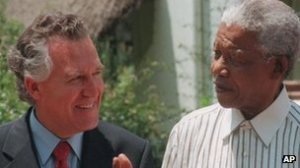I know that thousands of bloggers will be typing their thoughts, just as I am. But as we were driving home from a fish supper in Port Royal, listening to BBC Radio, I realized I must write something about how Mr. Nelson Rolihlahla Mandela enriched my life.
In 1969, apartheid still held South Africa in a relentless grip. That year, Mandela’s eldest son Thembekile was killed in a traffic accident. Mandela, who was in his sixth year of imprisonment on Robben Island, was forbidden from attending his funeral – just as, the year before, he had not been allowed to attend his mother’s funeral.
As a young idealistic student about to start my studies at Oxford University, I remember feeling outrage at this news. I had just joined the Young Liberals, which at that time was heavily influenced by a young man called Peter Hain. Mr. Hain’s family had left South Africa because of their opposition to apartheid, and settled in the United Kingdom a few years earlier. I remember meetings in their big living room in Putney. And a string of demonstrations in London, and in Oxford too.

In the same year, there was much anger and public demonstrations against a visit by the all-white Springboks rugby team to the UK. The following year a tour by the South African cricket team was canceled because of protests (yes, sports featured heavily in the anti-apartheid protests). Throughout my university years I remained outraged at the apartheid regime. (By the way, Peter Hain joined the Labour Party in 1977 and has been the Member of Parliament for Neath, in Wales since 1991).
Many years later in Jamaica, my husband and I went to the National Stadium in 1991 to see Mr. Mandela and his wife Winnie. It was late July, oppressively hot, and the air was thick with excitement. We were offered seats in the grandstand, but declined. We wanted to sit in the bleachers – a decision we later regretted (but that is another story). I remember waiting impatiently, while various performances went on. Vendors were selling “Winnie Mandela peanuts” and so on.
And remember, it was not until nearly two years after the Mandelas’ visit here that the apartheid regime was ended after long and at times difficult negotiations. South Africa was still going through that transition, and it was a period not without violence. But on Mandela’s part – no anger, no bitterness, no vengefulness. That made all the difference.
By the way, at the National Stadium not all of the entertainment was inspiring; a new deejay called Beenie Man was booed off stage because of his very inappropriate lyrics and was not heard of again for a while! When the Mandelas eventually entered the stadium in an open-top car, waving and holding their fists in the air, the sound was deafening and chaotic. Oh, there were no vuvuzelas then (thank heavens) – there was simply cheering voices. As the car came round to our side and the excitement swelled, several men jumped the perimeter fence and ran alongside the car, anxious to shake hands. The Mandelas’ security detail became very nervous.
I don’t remember Mr. Mandela’s speech. I don’t recall taking photographs (but must go back through our old photos and have a look. If so, I will post them). All I remember was the heat, and the excitement, and the remembrance of my anti-apartheid youth. What an extraordinary way the world turns.
In 2007, Mr. Mandela brought together The Elders, an independent group of global leaders working together for peace and human rights. Fellow South African and a member of the group Archbishop Desmond Tutu said on their website this evening, “He was a moral colossus, a global icon of forgiveness and reconciliation.”


It is the early hours of the morning in South Africa now. And Mr. Mandela is resting peacefully.

So many of the stories about Madiba are from leaders who took a long time to stop calling him and the ANC terrorists. Most of the anti-apartheid work was done by activists in faith groups, student organizations and unions. It’s great when we share these memories and recognize what determined civil society can do.
LikeLike
Yes, it’s true. We can then ignore the hypocrisy and concentrate on what matters…The people!
LikeLike
We all have to make sacrifice for things we believe in at least once in our life time. Great job Peter Hain.
LikeLike
Yes, we do indeed. Sacrifice may not be a popular word these days but in many ways Mandela’s life itself was the ultimate sacrifice (although he always admitted to not being perfect and making mistakes!) Mr. Hain did the right thing at the right time – the opportunity was there, with anti-apartheid sentiment already growing, so he used it most effectively to “up the ante.” And the pressure from outside should not be discounted as a major factor in ending apartheid. It wasn’t just the fashionable thing to do – it actually worked.
LikeLike
This is beautifully written.
LikeLike
Thanks very much! 🙂
LikeLike
Nice tribute. I may have to write about my Peter Hain connection (Blair Peach), one day.
LikeLike
Oh yes, I remember him. The SPG, right?
LikeLike